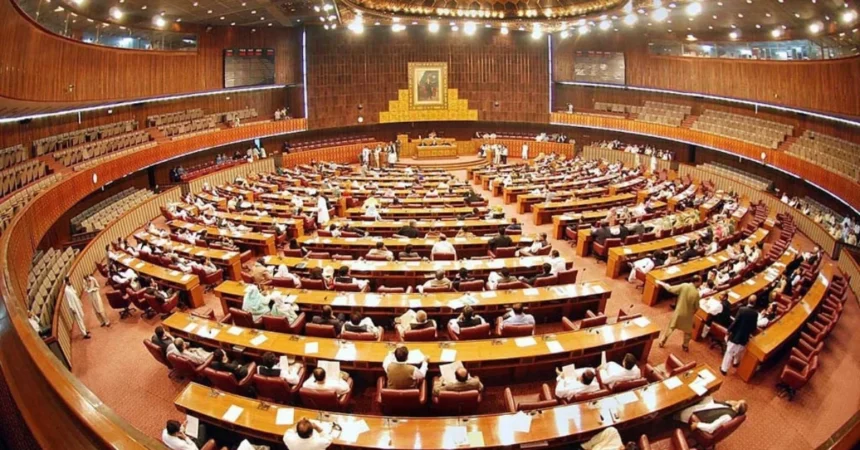A significant development has emerged in Pakistan’s judicial landscape with the formation of a parliamentary committee tasked with nominating the new Chief Justice of Pakistan (CJP). This committee, established under the 26th Constitutional Amendment, is set to play a crucial role in shaping the future of the country’s judiciary. The first meeting of the committee is scheduled for today, October 22, at 4 PM, where members will begin the important process of selecting a candidate for the esteemed position.
Composition of the Committee
The parliamentary committee consists of twelve members, comprising eight representatives from the National Assembly and four senators. This diverse group reflects a wide range of political affiliations, ensuring that the nomination process is representative of Pakistan’s major political parties.
Senate Members:
PTI: Senator Ali Zafar
JUI: Senator Kamran Murtaza
PML-N: Senator Azam Nazir Tarar
PPP: Senator Farooq H. Naik
National Assembly Members:
PML-N: Khawaja Asif, Ahsan Iqbal, Shaista Parvez Malik
PPP: Raja Pervaiz Ashraf, Naveed Qamar
MQM: Rana Ansar
Sunni Ittehad Council: Barrister Gohar Khan, Sahibzada Hamid Raza
The committee was formed following consultations with key parliamentary parties, including the Pakistan Muslim League-Nawaz (PML-N), Pakistan People’s Party (PPP), Jamiat Ulema-e-Islam (JUI), Sunni Ittehad Council, and Muttahida Qaumi Movement (MQM).
The New Selection Process
The establishment of this committee marks a pivotal change in the procedure for appointing the Chief Justice. Previously, the position was typically filled based solely on seniority among judges. However, under the 26th Constitutional Amendment, the committee is now required to select the CJP from among the three most senior judges of the Supreme Court, as outlined in Clause 3B of Article 175A of the Constitution. This change not only introduces a layer of political oversight but also aims to ensure a more balanced and fair selection process.
The current seniority list places Justice Syed Mansoor Ali Shah as the most senior judge, followed by Justice Munib Akhtar and Justice Yahya Afridi. If any of these judges decline the position, the next senior judge will be considered. This structured approach aims to mitigate potential conflicts and enhance the integrity of the judiciary.
Role of the Committee
The committee’s primary role is to evaluate candidates based on their qualifications, judicial philosophy, and ability to uphold the rule of law. To finalize a nomination, the committee must reach a two-thirds majority agreement, after which the selected name will be forwarded to the Prime Minister for approval. The Prime Minister’s endorsement is crucial, as it will lead to the issuance of an official notification for the new Chief Justice’s appointment.
This new procedure comes at a critical time for Pakistan’s judiciary, which has faced scrutiny and challenges in recent years. By involving a parliamentary committee in the selection process, lawmakers aim to reinforce the judicial appointment mechanism and restore public confidence in the judiciary’s independence and integrity.
Leading Candidates for the Chief Justice Position
As the committee prepares for its first meeting, attention is drawn to the potential candidates for the Chief Justice position. The three most senior judges of the Supreme Court—Justice Syed Mansoor Ali Shah, Justice Munib Akhtar, and Justice Yahya Afridi—are all considered strong contenders, each bringing unique qualifications and experiences to the table.
Justice Syed Mansoor Ali Shah
Justice Mansoor Ali Shah is known for his extensive judicial experience and has previously served as the Chief Justice of the Lahore High Court before his elevation to the Supreme Court in early 2018. His tenure has been marked by a commitment to upholding the rule of law and ensuring justice is served fairly and impartially.
Justice Shah’s legal acumen and dedication to judicial independence make him a prominent candidate for the position. However, as the most senior judge, he may also face pressure to consider the broader implications of his nomination on the judiciary’s credibility and political landscape.
Justice Munib Akhtar
Justice Munib Akhtar, born in 1963, joined the Supreme Court in 2018 and has gained recognition for his significant contributions to legal jurisprudence. His professional background includes a solid foundation in constitutional law, making him a well-rounded candidate for the Chief Justice position.
Justice Akhtar’s judicial philosophy leans towards a balanced interpretation of the law, which could resonate well with both the political class and the general public. His candidacy is bolstered by his ability to navigate complex legal challenges while maintaining a fair and just approach.
Justice Yahya Afridi
Justice Yahya Afridi is currently viewed as a frontrunner for the Chief Justice role, given his non-controversial and neutral stance during recent divisions within the apex court. His judicial career has been characterized by a commitment to impartiality and fairness, qualities that are highly regarded in today’s politically charged environment.
Government insiders suggest that Justice Afridi’s ability to maintain neutrality and avoid controversies surrounding judicial decisions may enhance his candidacy. His selection could signify a move towards a more consensus-driven judiciary, one that prioritizes stability and public trust.
The Significance of the 26th Constitutional Amendment
The 26th Constitutional Amendment, which received the President’s approval following the advice of Prime Minister Shehbaz Sharif, has introduced substantial changes to the judicial appointment process. One of the most noteworthy provisions is the fixed term for the Chief Justice, which is now set at three years or until the judge reaches the retirement age of 65. This is a significant departure from the previous system, which allowed judges to serve indefinitely based on seniority.
This amendment aims to bring accountability to the highest judicial office in the country, ensuring that the Chief Justice remains responsive to both the legal community and the public. By implementing term limits, lawmakers hope to promote a culture of responsibility and integrity within the judiciary.
Political Implications of the Nomination Process
The formation of the parliamentary committee and the accompanying changes in the appointment process are also indicative of broader political dynamics within Pakistan. As the country navigates a complex political landscape, the role of the judiciary remains pivotal. The selection of the Chief Justice will likely influence key judicial decisions, including those related to governance, elections, and civil rights.
Political parties have historically sought to exert influence over judicial appointments, and the establishment of this committee may be seen as a way to balance that influence. By involving a diverse range of political representatives, the committee can provide a platform for dialogue and consensus-building among parties, potentially leading to a more unified approach to judicial appointments.
Challenges Ahead
Despite the positive changes introduced by the 26th Amendment and the formation of the parliamentary committee, challenges remain. The nomination process will be closely scrutinized by the public, legal experts, and political observers alike. Any perception of bias or favoritism in the selection process could undermine the intended reforms and further erode public confidence in the judiciary.
Moreover, the committee’s ability to achieve a two-thirds majority on a nominee may present its own set of challenges, particularly in a politically charged environment. Political maneuvering and negotiations among party representatives will play a critical role in determining the success of the nomination process.
Future of Pakistan’s Judiciary
As the parliamentary committee meets today to begin the nomination process, the future of Pakistan’s judiciary hangs in the balance. The selection of the new Chief Justice will not only impact the judiciary’s immediate functioning but will also set a precedent for future appointments.
The committee’s work is crucial in ensuring that the judiciary remains an independent and impartial arbiter of justice. By engaging in a transparent and representative selection process, the parliamentary committee has the opportunity to restore faith in the judicial system and reinforce the rule of law in Pakistan.
The stakes are high, and all eyes will be on the committee as it navigates this pivotal moment in Pakistan’s legal history.







